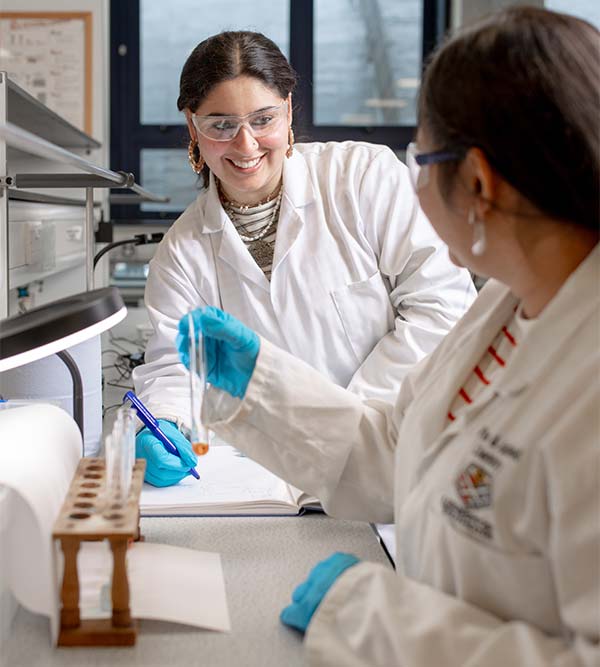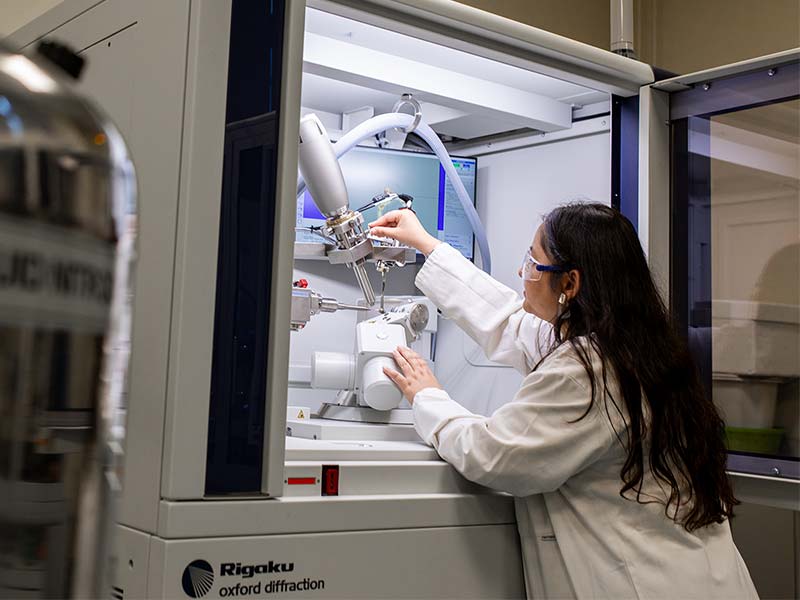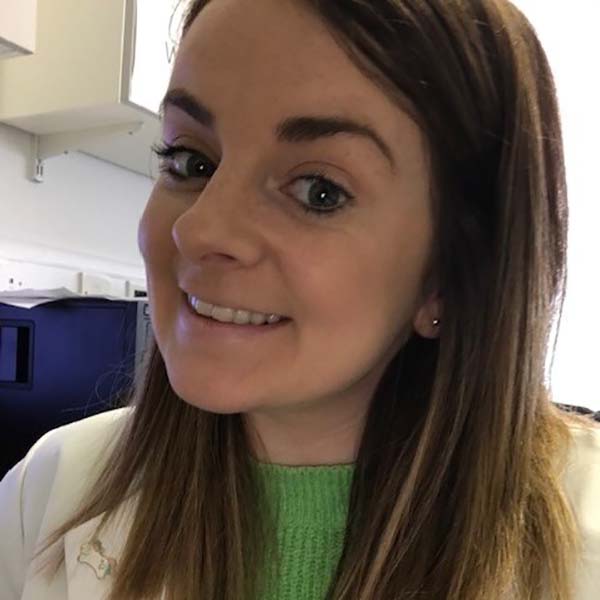BSc (Hons), MChem Chemistry
ApplyKey facts
- UCAS Code: F100, F103
- Accreditation: Royal Society of Chemistry
Ranked: 1st in the UK for Chemistry, with the maximum score of 100/100 (Guardian University Guide, 2026)
Second-year entry: available
Work placement: For MChem, 12-month placement - UK or abroad
Study with us
- you’ll benefit from our strong industry links, internationally recognised research and teaching staff, and close relationships with professional bodies
- you’ll study a broad chemistry curriculum, providing maximum flexibility when choosing a career path
- we give you the option to switch between our other BSc (Hons) and MChem courses up to Year 3
- this course is accredited by the Royal Society of Chemistry
The course is accredited by the Royal Society of Chemistry for the purpose of fully meeting the educational requirement for Chartered Chemist.
The Place of Useful Learning
UK University of the Year
Daily Mail University of the Year Awards 2026
Scottish University of the Year
The Sunday Times' Good University Guide 2026
Why this course?
In this course, you'll study both pure and applied chemistry. Pure chemistry is about unravelling the mysteries of molecular structure and reactivity. Applied chemistry uses chemical knowledge to respond to the challenges created by society.
Advanced classes include photochemistry, cage and cluster modules, environmental chemistry, polymer chemistry and molecular catalysis.
Both the BSc (Hons) and MChem are accredited by the Royal Society of Chemistry. The Chemistry course is for students who want complete coverage of the subject to keep their career options open. Transferable skills are taught in all years and include IT, scientific writing, presentation skills, report writing and problem-solving.
You can study at a European university for one year of your degree, and for MChem students, this may be your placement year.
It’s possible to switch between our other courses.
The industrial placement year was definitely the most beneficial part of the course.
Final year student, MChem Chemistry


What you’ll study
Year 1
You'll take foundation classes in chemistry, mathematics, and physics or biology at introductory or advanced level. Classes in forensic science, drug discovery and chemical engineering are available depending on your degree choice.
Practical chemistry laboratory sessions help you to master basic preparative and analytical skills.
Years 2 & 3
In later years, classes will include fundamental inorganic, organic, biological and physical chemistry. Laboratory work increases to four afternoons per week and your practical skills are enhanced with computer modelling and group exercises to develop presentational skills.
Year 4 MChem
MChem students may undertake a paid 12-month industrial placement. Research and Knowledge Exchange placements are also available. For BSc (Honours) students Year 4 is the final year.
Year 4 BSc (Hons) and Year 5 MChem
In the final year, you’ll specialise in the areas and applications that interest you most and undertake a research project.
Study abroad
As part of your course, you have the option to spend one year studying at a University abroad. Typically, this exchange takes place in your 3rd year and you'll be expected to study a curriculum similar to the one you would have taken at Strathclyde.
Students apply via an online mobility portal which includes all of the universities that participate in this credit exchange scheme. Studies at these institutions, which are located all around the world (Europe, North America, Asia), do not attract additional tuition fees and you'll continue to receive SAAS funding. However, your travel, accommodation, living and health insurance costs will need to be found. There are a number of competitive grants that can be applied for to support your exchange.
For MChem students, there is also the opportunity to spend your placement year abroad.
Student competitions
The Dean of Science recognises exceptional performance each year through the Dean’s certificate for the best students in the faculty.
Students can also win prizes including:
- Andersonian Centenary Medal Prize
- Sir George Beilby Memorial Medal
- JLS Allan Memorial Prize
- Beilby and Huddleston Prize
- GlaxoSmithKline Prize for Organic Chemistry
- Syngenta Prize for Preparative Chemistry
- ICI Chemical and Polymers Group Andersonian Centenary Prize
- Professor David C Sherrington FRS Prize
Strathclyde chemistry students also compete successfully for national awards. In recent years, our students have won:
- Salters’ Graduate prize
- Carnegie Scholarship
- Most Meritorious Student award from the Forensic Science Society
Work placement (MChem only)
You may undertake a paid 12-month placement in industry, either in the UK or abroad.
Research and knowledge exchange placements within the department are also available.
The Strathclyde chemistry industrial placement scheme is one of the longest-running in the UK, and more than 70 students are placed with companies each year.
The Chemistry Clinic
Find out more about the work of the Chemistry Clinic.
Education for Sustainable Development
Education for Sustainable Development (ESD) is a core part of our mission; it is a guiding principle for how we teach, research, and operate as a Department.
Chemists play an essential role in addressing global challenges - from climate change and resource scarcity to the development of sustainable materials, and clean energy technologies. Our commitment to ESD ensures that every student and researcher is empowered through the development of knowledge, skills, values, attitudes and behaviours to contribute to a more sustainable future for the environment, our economy, and our society.
The Department of Pure and Applied Chemistry is fully committed to Education for Sustainable Development and the UN Sustainable Development Goals as part of the Strathclyde 2030 strategy to encourage everyone to make smart, responsible choices that help create a better future for everyone.
Each of our courses contributes towards the UN Sustainable Development Goals, no matter the focus, such that all our graduates can play an active role in the protection of people and planet. All UN Sustainable Development Goals are relevant; however, we particularly explore the following goals in courses:
- Goal 3: Good health and well-being
- Goal 6: Clean water and sanitation
- Goal 7: Affordable and clean energy
- Goal 11: Sustainable cities and communities
- Goal 12: Responsible consumption and production
- Goal 14: Life on below water
- Goal 15: Life on land
Facilities
You'll benefit from excellent teaching in theory modules, complemented by hands-on experience in our supportive practical teaching laboratories.
In Year 1, you'll begin in a nurturing environment, mastering the fundamentals of synthetic chemistry and chemical analysis in our dedicated first year teaching laboratory. This strong foundation allows you to advance to our specialised second and third-year laboratories, where your knowledge and skills will expand.
Throughout your journey, you are guided by enthusiastic and dedicated laboratory demonstrators. These include academic staff, technical personnel, and postgraduate mentors.
You'll also gain experience with a wide range of specialised equipment such as chromatography systems (HPLC, GC, and IC), ATR-IR spectroscopy, and rotary evaporators.

The skills and confidence developed over these three years prepare you for your industrial placement year, where our well-trained students are highly regarded by employers.
In the final year of our Masters programme, you'll undertake a research project in one of our cutting-edge research laboratories. Here, you'll work alongside research students and staff on the latest scientific advancements, utilising state-of-the-art analytical facilities, including NMR spectroscopy, mass spectrometry and X-ray crystallography.
Chat to a student ambassador
Want to know more about what it’s like to be a Science student at the University of Strathclyde? A selection of our current students are here to help!
Our Unibuddy ambassadors can answer all your questions about courses and studying at Strathclyde and offer insight into their experiences of life in Glasgow and Scotland.
Personal Development Planning (PDP)
You normally have the same Personal Development Adviser (PDA) throughout your degree. PDP is an important part of learning and personal development. It's not only associated with your university course, it allows you to plan for the future.
Chemistry: Principles & Practice 1 & 2 (40 Credits)
These lectures and tutorials cover all the broad areas of chemistry including: Analytical Chemistry, Structure & Bonding, Physical Chemistry, Inorganic Chemistry, Organic Chemistry and Spectroscopy.
Practical & Transferable Skills (20 Credits)
You will have one laboratory class per week which runs in both Semester 1 and Semester 2.
Mathematics 1C (20 Credits)
This module will provide you with a basic understanding of mathematical functions, differentiation, integration, complex numbers, matrices and vectors.
Foundation Science: Big Ideas for Chemists (20 Credits)
This module will provide you with a broad foundation in fundamental scientific thought and theory, underpinning your future as a professional scientist.
Elective modules (20 or 40 Credits) (Optional)
You can select elective modules freely from the University timetable subject to your possessing appropriate entrance qualifications, there being places available, and the times do not clash with compulsory chemistry classes.
Subjects are available in:
- Science
- Engineering
- Business
- Arts & Humanities
Chemistry students are provided with a list of classes where the timetable is suitable, although other options are also available. Students often choose a language class as an elective.
Inorganic Chemistry (20 Credits)
This module will provide you with a broad knowledge of the important concepts in inorganic chemistry from which more specialist topics can be tackled. This includes investigation of the chemistry of the main group and transition metals and introduces topics at the forefront of inorganic and materials chemistry.
Fundamental Organic Chemistry (20 Credits)
This module covers the fundamental principles of infra-red, ultra-violet, nuclear magnetic resonance and mass spectroscopy; develops competence in the interpretation of spectra and your awareness of the role of spectroscopic techniques. It will also develop your knowledge of reactions, understanding of mechanisms and appreciation of the role of reactivity in organic chemistry.
Physical Chemistry 1 (20 Credits)
This module provides a broad knowledge of the important concepts in Thermodynamics, investigating the major features as applied to chemical systems. Topics include:
- the importance of reaction rates in chemical systems
- concepts of the electrode/solution interface
- equilibrium and electron transfer kinetics
- mass transport
- the composition and utilisation of fossil fuels with their environmental pollutants
- nuclear and renewable energy sources
Practical Organic & Inorganic Chemistry (20 Credits)
You'll receive a practical demonstration of topics contained in the lectures. You'll develop basic laboratory skills in preparative chemistry and analysis, and gain experience in the applications of spectroscopy and common instrumental techniques.
Practical Physical and Applied Chemistry and Chemical Analysis (20 Credits)
You'll conduct experiments and gain practical experience of the theoretical aspects covered in lectures. You'll develop skills in the demonstration of physical chemical principles, observation, the use of statistical methods, interpretation of data and the writing of laboratory reports.
Forensic Trace Analysis and Analytical Chemistry (20 Credits)
This module provides fundamental concepts of separation science and outlines its importance in obtaining information about analytes in a sample. Also covers the fundamental concepts of recovery of trace evidence and treatment of materials to provide identification. You're taught how to handle, examine and assess errors in chemical measurements.
Compulsory modules
Physical Chemistry 2 (20 Credits)
This module provides you with an understanding of intermolecular forces and their importance in defining key aspects of chemical behaviour and molecular organization. It introduces:
- surface chemistry and the common systems in which it plays a major role
- the electronic structure of atoms and molecules through the prism of quantum chemistry
- group theory and how it can be applied to the determination of the symmetry of molecules and their properties
- the principles of bonding in molecules as described by valence bond and molecular orbital theories
Practical Organic & Inorganic Chemistry (20 Credits)
In this module you'll receive a practical demonstration of topics contained in the lectures. You'll develop basic laboratory skills in preparative chemistry and analysis, and gain experience in the applications of spectroscopy and common instrumental techniques.
Intermediate Organic Chemistry & Spectroscopy (20 Credits)
This module teaches you modern NMR spectroscopy as it is applied to chemistry. It covers:
- skills for handling and interpreting NMR data for the purposes of chemical structure elucidation
- theoretical basis of the NMR experiment using the vector formalism
- reactivities of organic molecules
- organic syntheses using the disconnection approach
- synthesis and reactivities of electron-poor and electron-rich heterocyclic molecules
It provides an insight into the role of computational chemistry in chemical research and training in the use of modern computational chemistry software.
Inorganic Chemistry, Structures & Spectroscopy (20 Credits)
This module provides you with a more advanced view of main group and transition metal coordination and organometallic chemistry. Themes to be covered include ligands and their influence on complexes, trends in structure and bonding, stereochemistry, reactivity, and the application of spectroscopic and other methods of identification. Also, modern spectroscopy as it is applied in chemistry.
Practical Physical, Applied, Forensic & Analytical Chemistry (20 Credits)
In this module you'll conduct experiments and gain practical experience of the theoretical aspects covered in lectures. You'll develop skills in: the demonstration of physical chemical principles; observation; the use of statistical methods; interpretation of data and the writing of laboratory and court reports.
Optional modules
Choose one from the following:
Analytical Chemistry & Drugs of Abuse (20 Credits)
This module covers the fundamental analytical methods and advanced theories in chromatography, mass spectrometry and electroseparations.
It introduces the concept of experimental design and its application in analytical, forensic and preparative chemistry, and how to perform analytical calculations and interpret data. The analytical procedures used to identify substances controlled under the Misuse of Drugs Act 1971, Misuse of Drugs Regulations 2001, the Medicines Act 1968 and the World Anti-Doping Agency.
You're introduced to methods of clandestine synthesis and how drug profiling can identify the synthetic route used. The pharmacology of drugs of abuse and the various biological matrices used in drug screening will also be described.
Chemical Biology (20 Credits)
This module will provide a detailed overview on the structure, function and chemistry of biological macromolecules such as proteins, nucleic acids, lipids and carbohydrates. Topics include:
- protein & nucleic acid folding
- energetics of macromolecular interactions (kinetics & thermodynamics)
- mechanistic enzymology
The overarching theme in this course is that structure and function are intimately linked.
Compulsory
Distance Learning (40 Credits)
Students on placement in Year 4 continue their studies using online learning materials, with progress assessed through the submission of coursework. Topics studied through distance learning include:
- Process analytical chemistry
- Oxidation and reduction processes in organic synthesis
- Polymers and mechanism
Optional
Choose one from the following:
Industrial Placement (80 Credits)
Students may undertake a 12-month placement in the UK or overseas at a chemical company. Examples of companies with which our students have been placed include GlaxoSmithKline, Pfizer, Astra Zeneca and Roche. In addition to providing you with relevant industrial experience, you will receive a salary from the company that you work for.
Research Placement (80 Credits)
Students may opt to undertake a 12-month placement within the Department of Pure and Applied Chemistry, working on a research project with one of our experienced academic staff to address real-life challenges in the field.
Knowledge Exchange Placement (80 Credits)
Students may opt to undertake a 12-month placement within Strathclyde’s ‘Chemistry Clinic’. This initiative provides opportunities for businesses to access advice, facilities and instrumentation from students and staff within Strathclyde’s Department of Pure and Applied Chemistry, to further their projects, processes and materials.
Core Chemistry (20 Credits)
This module covers more advanced topics in chemistry, such as:
- Key Reactions in Organic Chemistry
- Cage and Cluster Molecules
- Environmental Chemistry
- Chemistry in the Excited State
BSc Chemistry Specialisation (40 credits)
In this module, you'll have the opportunity to specialise in a number of areas within chemistry, such as:
- Advanced & modern methods in organic synthesis
- Molecular catalysis
- Polymers: synthesis & chemical properties
- Solid state chemistry
- Interpretative spectroscopy
- Nanochemistry applications in medicinal chemistry
BSc Projects (40 credits)
Over the course of the year, you will undertake a Literature Review on an area of your choosing, which will be supported by our experienced academics, leading to the production of a dissertation. Additionally, you will undertake a group Practical Project focused on modern, real-world issues where chemistry can contribute to a solution.
Careers & Professional Skills (20 credits)
This module aims to develop:
- professional and personal attributes
- graduate attributes and skills that will be applicable for future careers
Core Chemistry (20 Credits)
This module covers more advanced topics in chemistry, such as:
- Key Reactions in Organic Chemistry
- Cage and Cluster Molecules
- Environmental Chemistry
- Chemistry in the Excited State
MChem Chemistry Specialisation (40 Credits)
In this module, you'll have the opportunity to specialise in a number of areas within chemistry, such as:
- Advanced & modern methods in organic synthesis
- Molecular catalysis
- Polymers: synthesis & chemical properties
- Solid state chemistry
- Interpretative spectroscopy
- Nanochemistry applications in medicinal chemistry
Final-Year Project & Dissertation (60 Credits)
Over the course of the year, you'll complete a practical research project relating to your chosen area of chemistry under the supervision of one of our experienced academics, leading to the production of a dissertation.
Learning & teaching
Each year contains compulsory classes and some years contain either optional classes, which relate to different areas of chemistry and/or elective classes from other subject areas in the University.
In Years 1 to 3, lectures give you the essential knowledge and understanding required by all chemistry graduates. This is supported by small and large group tutorials. Chemistry is a practical subject, and you'll gain training in all branches of mainstream practical chemistry.
For MChem students, your fourth year is a 12-month industrial placement or research/knowledge exchange placement within the University. You’ll continue your studies through distance learning assignments.
In your final year, you’ll study advanced chemistry and complete an independent research project in your chosen field.
Guest lectures
The Andersonian Chemical Society (the longest-running student organisation in the UK) organises guest speakers and other events, including very popular social events.
Assessment
Assessment methods include:
- short answer class tests
- multiple choice tests
- end of year examinations
- oral presentation
- group project work
Entry requirements
Required subjects are shown in brackets.
| Highers |
Year 1 entry: ABBB/AABC (Chemistry B and Maths B) Higher Applications of Mathematics is not accepted in place of Higher Mathematics. Advanced Higher Chemistry and Maths recommended for S6 study and to compensate for missed Higher grades in S5. Year 1 entry: BBBB/ABBC (Chemistry B and Maths B) Higher Applications of Mathematics is not accepted in place of Higher Mathematics. Advanced Higher Chemistry and Maths recommended for S6 study and to compensate for missed Higher grades in S5. Applicants with grades slightly below the minimum requirements may be considered for admission subject to successful completion of the Strathclyde STEM Summer School. |
|---|---|
| Advanced Highers | Minimum entry requirements: Year 2 entry: BBB (Chemistry B and Maths B) |
| A Levels | Standard entry requirements*: Year 2 entry: BBB Year 1 entry: BBB |
| International Baccalaureate | Standard entry requirements*: Year 2 entry: 30 (Chemistry and Maths at HL) Year 1 entry: 30 (Chemistry at HL and one of Maths, Physics or Biology at HL) |
| HNC/HND | Year 1 entry: relevant HNC, B in Graded Unit Please contact us to discuss the relevance of your HNC/HND. |
| International students | View the entry requirements for your country. |
| Deferred entry | Accepted |
*Standard entry requirements
Offers are made in accordance with specified entry requirements although admission to undergraduate programmes is considered on a competitive basis and entry requirements stated are normally the minimum level required for entry.
Whilst offers are made primarily on the basis of an applicant meeting or exceeding the stated entry criteria, admission to the University is granted on the basis of merit, and the potential to succeed. As such, a range of information is considered in determining suitability.
In exceptional cases, where an applicant does not meet the competitive entry standard, evidence may be sought in the personal statement or reference to account for performance which was affected by exceptional circumstances, and which in the view of the judgement of the selector would give confidence that the applicant is capable of completing the programme of study successfully.
**Minimum entry requirements
Entry requirements
Required subjects are shown in brackets.
| Highers |
ABBB or AABC (Chemistry B and Maths B) Higher Applications of Mathematics is not accepted in place of Higher Mathematics. Advanced Higher Chemistry and Maths recommended for S6 study and to compensate for missed Higher grades in S5. ABBC or BBBB (Chemistry B and Maths B) Higher Applications of Mathematics is not accepted in place of Higher Mathematics. Advanced Higher Chemistry and Maths recommended for S6 study and to compensate for missed Higher grades in S5. Applicants with grades slightly below the minimum requirements may be considered for admission subject to successful completion of the Strathclyde STEM Summer School. |
|---|---|
| Advanced Highers | Year 2 entry: ABB (Chemistry B and Maths B) |
| A Levels |
|
| International Baccalaureate |
|
| HNC/HND |
Please contact us to discuss the relevance of your HNC/HND. |
| International students | View the entry requirements for your country. |
| Deferred entry | Accepted |
*Standard entry requirements
Offers are made in accordance with specified entry requirements although admission to undergraduate programmes is considered on a competitive basis and entry requirements stated are normally the minimum level required for entry.
Whilst offers are made primarily on the basis of an applicant meeting or exceeding the stated entry criteria, admission to the University is granted on the basis of merit, and the potential to succeed. As such, a range of information is considered in determining suitability.
In exceptional cases, where an applicant does not meet the competitive entry standard, evidence may be sought in the personal statement or reference to account for performance which was affected by exceptional circumstances, and which in the view of the judgement of the selector would give confidence that the applicant is capable of completing the programme of study successfully.
**Minimum entry requirements
Contextual Admissions for Widening Access
We want to increase opportunities for people from every background.
Strathclyde selects our students based on merit, potential, and the ability to benefit from the education we offer. We look for more than just your grades. We consider the circumstances of your education and will make lower offers to certain applicants as a result.
University preparation programme for international students
We offer international students (non-UK/Ireland) who do not meet the academic entry requirements for an undergraduate degree at Strathclyde the option of completing an Undergraduate Foundation Programme in Business and Social Sciences at the University of Strathclyde International Study Centre.
Upon successful completion, you can progress to your chosen degree at the University of Strathclyde.
International students
We've a thriving international community with students coming here to study from over 140 countries across the world. Find out all you need to know about studying in Glasgow at Strathclyde and hear from students about their experiences.

Fees & funding
All fees quoted are for full-time courses and per academic year unless stated otherwise.
Fees may be subject to updates to maintain accuracy. Tuition fees will be notified in your offer letter.
All fees are in £ sterling, unless otherwise stated, and may be subject to revision.
Annual revision of fees
Students on programmes of study of more than one year (or studying standalone modules) should be aware that the majority of fees will increase annually.
The University will take a range of factors into account, including, but not limited to, UK inflation, changes in delivery costs and changes in Scottish and/or UK Government funding. Changes in fees will be published on the University website in October each year for the following year of study and any annual increase will be capped at a maximum of 10% per year. This cap will apply to fees from 2026/27 onwards, which will not increase by more than 10% from the previous year for continuing students.
| Scotland | To be confirmed. Fees for students domiciled in Scotland are subject to confirmation by the Scottish Funding Council. Scottish undergraduate students undertaking an exchange for a semester/year will continue to pay their normal tuition fees at Strathclyde and will not be charged fees by the overseas institution. |
|---|---|
| England, Wales & Northern Ireland | £9,790 Fees for students domiciled in the Rest of the UK are subject to Parliamentary approval. |
| Republic of Ireland |
If you are an Irish citizen and have been ordinary resident in the Republic of Ireland for the three years prior to the relevant date, and will be coming to Scotland for Educational purposes only, you will meet the criteria of England, Wales & Northern Ireland fee status. For more information and advice on tuition fee status, you can visit the UKCISA - International student advice and guidance - Scotland: fee status webpage. Find out more about the University of Strathclyde's fee assessments process. |
| International | £29,350 |
| University preparation programme fees | International students can find out more about the costs and payments of studying a university preparation programme at the University of Strathclyde International Study Centre. |
| Additional costs |
International students: International students may have associated visa and immigration costs. Please see student visa guidance for more information. |
| Available scholarships | Take a look at our scholarships search for funding opportunities. |
Please note: All fees shown are annual and may be subject to an increase each year. Find out more about fees.
How can I fund my studies?
Students from Scotland
Fees for students who meet the relevant residence requirements in Scotland, you may be able to apply to the Student Award Agency Scotland (SAAS) to have your tuition fees paid by the Scottish government. Scottish students may also be eligible for a bursary and loan to help cover living costs while at University.
For more information on funding your studies have a look at our University Funding page.
Students from England, Wales & Northern Ireland
We have a generous package of bursaries on offer for students from England, Northern Ireland and Wales:
You don’t need to make a separate application for these. When your place is confirmed at Strathclyde, we’ll assess your eligibility. Take a look at our scholarships search for funding opportunities.
International Students
We have a number of scholarships available to international students. Take a look at our scholarship search to find out more.
What our students think

Naomi Mackay
In my first post-university job, my experience from industrial placement saw me “hit the ground running” and earned me an early promotion!

Fraser Gunn
All the staff members in the department from the lab technicians, the lecturers, the store staff and the office staff were all friendly and approachable and made me feel at home within the department.

Nicholas Boname
I really like the chemistry department. They are extremely supportive and do their best to accommodate the needs of the students. The campus is green with lots of trees and some historical architecture, and the union provides a great place to take a break between classes.
Careers
There’s a continuous demand for chemistry graduates. Our graduates compete successfully for jobs in all branches of the chemical industry. These are well-rewarded careers that allow you to go on to supervisory or management roles. Your chances of employment are substantially increased by the industrial placement and training.
A degree in chemistry opens doors to a wide variety of employment opportunities. The range of available jobs is considerable and covers many different types of chemistry and industries such as nanotechnology, large-scale chemical plants, the drinks and pharmaceutical industries or teaching. Studying our MChem degree further increases your chances of employment by having completed the industrial placement.
Your skills will also be in demand in other areas. A study of chemistry helps you develop logical thought and numerical skills and the ability to write accurate and concise reports. As a result, our chemists are in demand in national and local government, in hospitals and in education at all levels.
This course is accredited by the Royal Society of Chemistry and graduates are eligible to apply for the status of Chartered Chemist, the qualification recognised in the UK and EU for professional chemists.
How much will I earn?
The average salary 15 months after graduating is £28,000 (Discover Uni, 2024).
Career opportunities in the UK & overseas
Jobs directly related to your degree include:
- Analytical chemist
- Biotechnologist
- Clinical research associate
- Colour technologist
- Crime scene investigator
- Food technologist
- Forensic scientist
- Medicinal chemist
- Nanotechnologist
- Oceanographer
- Palaeontologist
- Pharmacologist
- Radiation protection practitioner
- Research scientist (physical sciences)
- Science writer
- Toxicologist
Jobs where your degree would be useful include:
- Actuary
- Business analyst
- Civil service fast streamer
- Data analyst
- Environmental consultant
- Higher education lecturer
- Nuclear engineer
- Patent attorney
- Product/process development scientist
- Secondary school teacher
(Information taken from Prospects, 2024)
Glasgow is Scotland's biggest & most cosmopolitan city
Our campus is based right in the very heart of Glasgow. We're in the city centre, next to the Merchant City, both of which are great locations for sightseeing, shopping and socialising alongside your studies.
Apply
Please note: applications for September 2027 entry will open in September 2026.
Start date: Sep 2026
MChem Chemistry (1 year entry)
Start date: Sep 2026
MChem Chemistry (2 year entry)
Start date: Sep 2026
BSc Chemistry (1 year entry)
Start date: Sep 2026
BSc Chemistry (2 year entry)
Contact us
Find out more about the programme
Have you considered?
We've a range of Chemistry courses similar to this one which may also be of interest.

